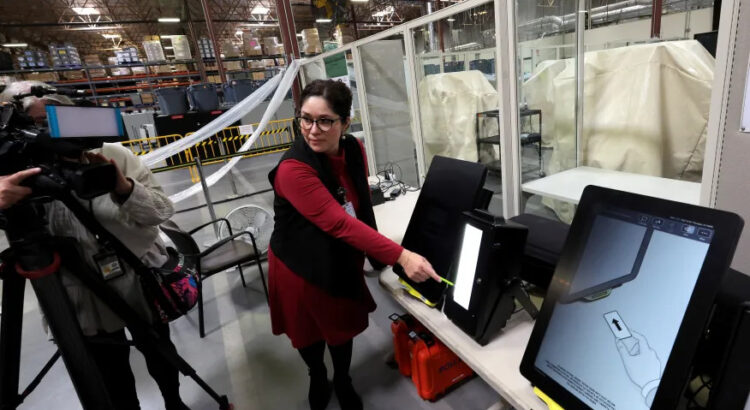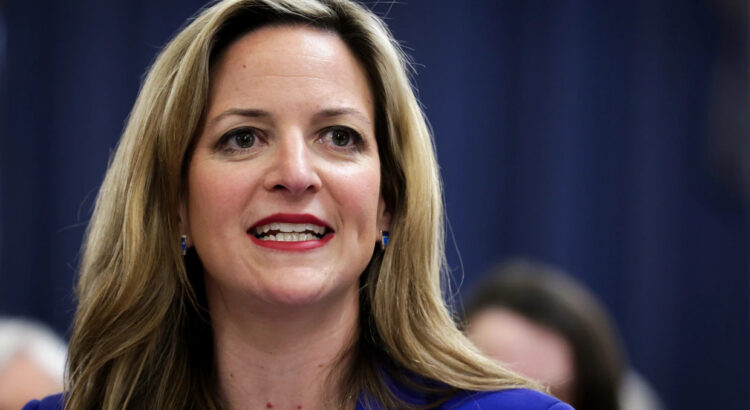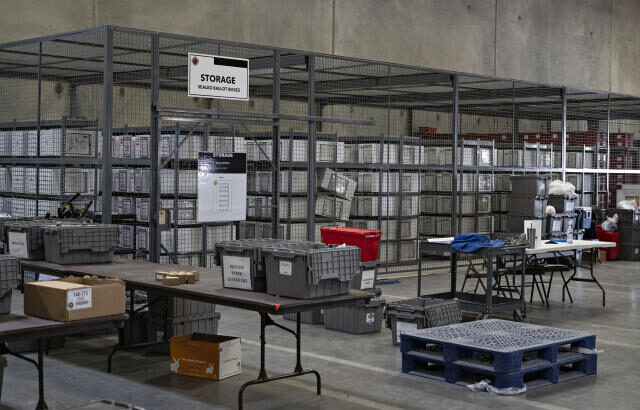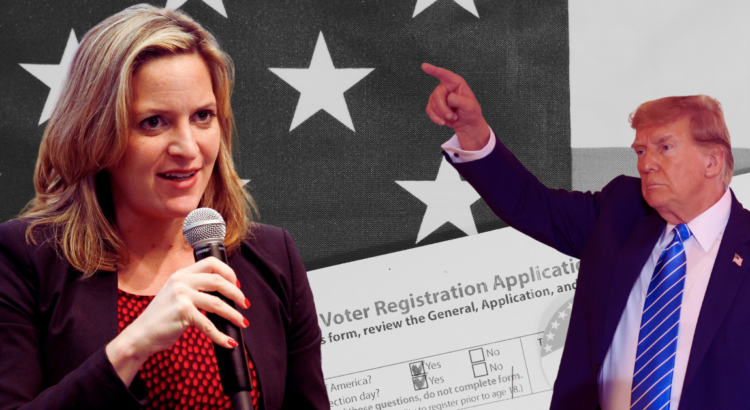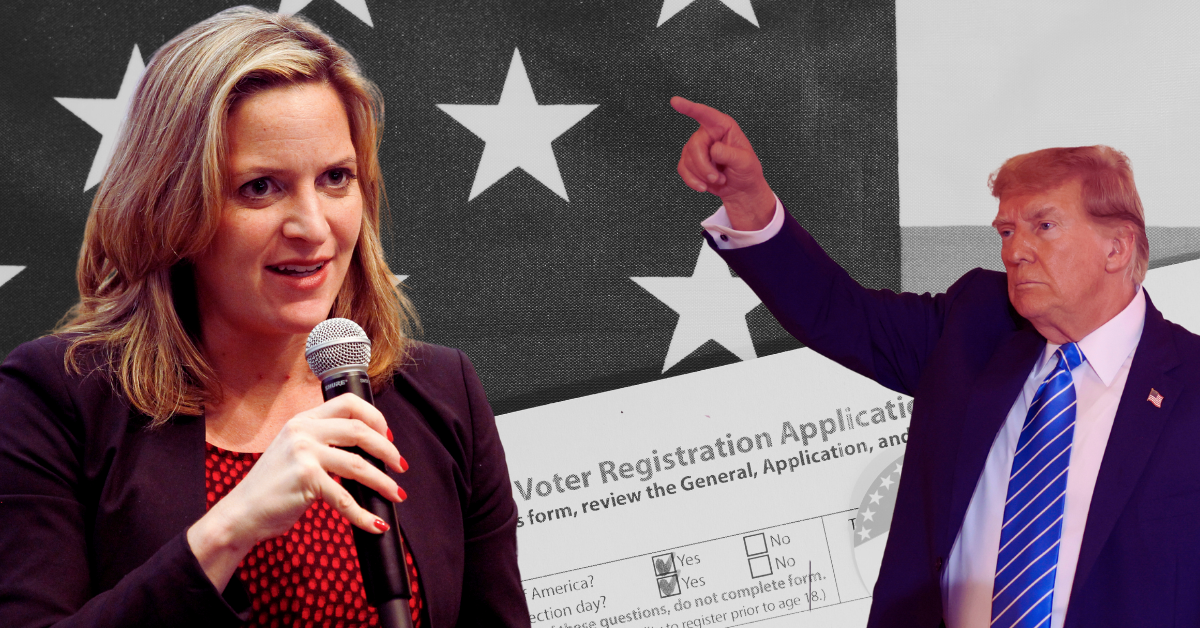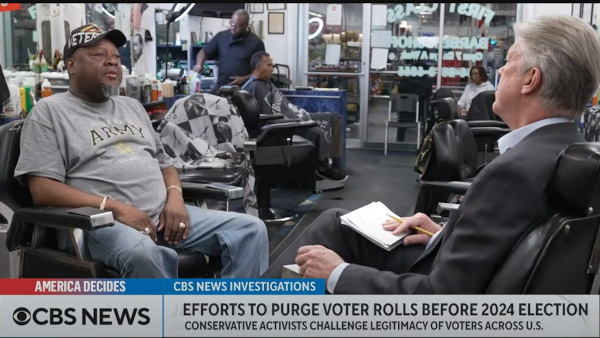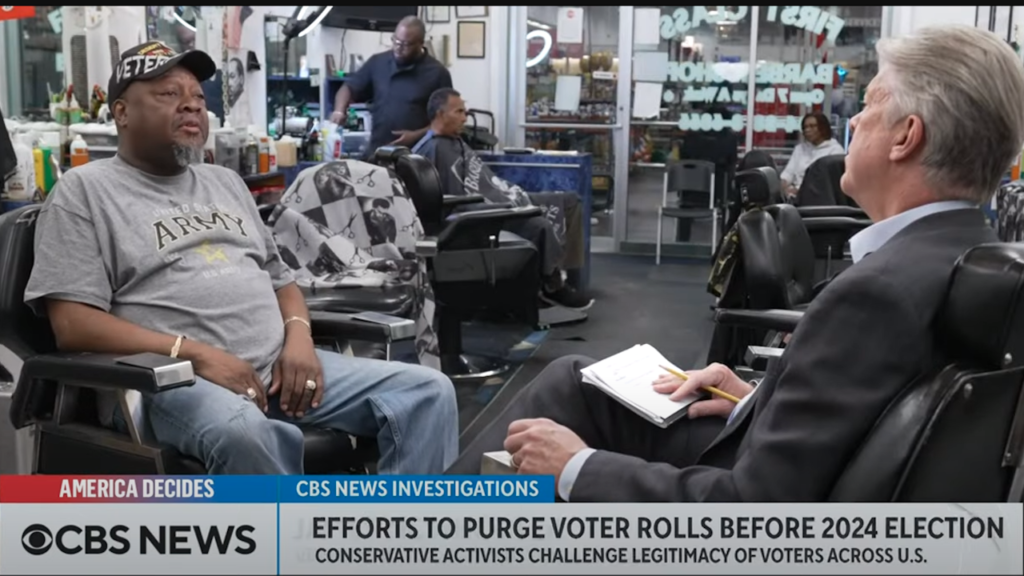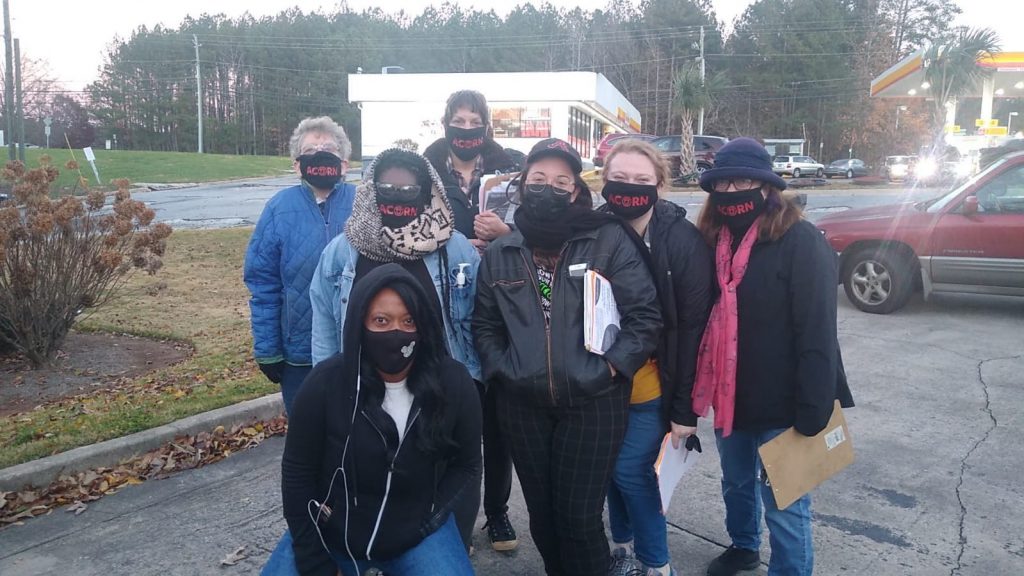Trump’s Allies Ramp Up Campaign Targeting Voter Rolls
Calling themselves investigators, activists are using new data tools and disputed legal theories to urge officials to drop voters from the rolls.
A network of right-wing activists and allies of Donald J. Trump is quietly challenging thousands of voter registrations in critical presidential battleground states, an all-but-unnoticed effort that could have an impact in a close or contentious election.
Calling themselves election investigators, the activists have pressed local officials in Michigan, Nevada and Georgia to drop voters from the rolls en masse. They have at times targeted Democratic areas, relying on new data programs and novel legal theories to justify their push.
In one Michigan town, more than 100 voters were removed after an activist lobbied officials, citing an obscure state law from the 1950s. In the Detroit suburb of Waterford, a clerk removed 1,000 people from the rolls in response to a similar request. The ousted voters included an active-duty Air Force officer who was wrongly removed and later reinstated.
The purge in Waterford went unnoticed by state election officials until The New York Times discovered it. The Michigan secretary of state’s office has since told the clerk to reinstate the voters, saying the removals did not follow the process laid out in state and federal law, and issued a warning to the state’s 1,600 clerks.
The Michigan activists are part of an expansive web of grass-roots groups that formed after Mr. Trump’s attempt to overturn his defeat in 2020. The groups have made mass voter challenges a top priority this election year, spurred on by a former Trump lawyer, Cleta Mitchell, and True the Vote, a vote-monitoring group with a long history of spreading misinformation.
Their mission, they say, is to maintain accurate voting records and remove voters who have moved to another jurisdiction. Democrats, they claim, use these “excess registrations” to stuff ballot boxes and steal elections.
The theory has no grounding in fact. Investigations into voter fraud have found that it is exceedingly rare and that when it occurs, it is typically isolated or even accidental. Election officials say that there is no reason to think that the systems in place for keeping voter lists up-to-date are failing.
The bigger risk, they note, is disenfranchising voters.
“If you’re challenging 1,000 voters at once, you are not bringing the sophistication required when you are handling someone’s constitutional right,” said Michael Siegrist, the clerk of Canton Township, Mich., and a board member of the Michigan Association of Municipal Clerks.
In an email response to questions, Ms. Mitchell dismissed those concerns.
“The only persons ‘disenfranchised’ by following the law are the illegal voters, whose illegal registrations suppress and dilute the votes of those who are lawfully registered,” she said. “Our primary goal is to see that the laws of the states are followed and enforced by those sworn to administer the elections according to the applicable law.”
It is difficult to know precisely how many voters have been dropped from the rolls as a result of the campaign — and even harder to determine how many were dropped in error. A Times review of challenges in swing states, which included public records, interviews and audio recordings, suggested the activists were rarely as effective at removing voters as they were in Waterford.
But even when they fail, the challenges have consequences. In some states, a challenge alone is enough to limit a voter’s access to a mail ballot, or to require additional documentation at the polls. Privately, activists have said they consider that a victory.
At the same time, right-wing media outlets have promoted the challenges, casting public officials as corrupt and creating fodder that could be used in another round of legal challenges should Mr. Trump lose again.
“It really is aimed at being able to cast doubt on the results after the fact,” said Joanna Lydgate, the chief executive of States United Democracy Center, a nonpartisan organization. “But also, before the election itself, at being able to shape who turns out and how they turn out.”
In Michigan, activists call their project Soles to the Rolls — an apparent play on Souls to the Polls, the get-out-the-vote effort popular in Black churches.
The undertaking pulls from every corner of the election-denial movement. Its parent group is an offshoot of Ms. Mitchell’s national network. A top deputy to Mike Lindell, a leading promoter of election-related conspiracy theories, helped conceive of the data program the activists use to hunt for suspicious voters, according to recordings reviewed by The Times. The state’s Republican Party, which is mired in a leadership dispute, has also endorsed the data program, and the Trump campaign cited its numbers in a misinformation-riddled report released in January.
That program, called Check My Vote, identifies addresses with irregularities, such as missing an apartment number or having an unusually high number of registered voters.
In training sessions, Tim Vetter, a developer of the system, has acknowledged that it turned up large numbers of supposedly questionable voters in dense areas of Detroit and in student housing in Ann Arbor, both overwhelmingly Democratic cities.
Activists can then use the data to assemble lists of voters to challenge. The program also tracks the outcome of the challenge and whether a voter later tries to vote, information that could be shared with election officials or law enforcement, Mr. Vetter has said, according to recordings reviewed by The Times.
“That’s just garbage,” Chris Thomas, an elections consultant for Detroit, said of the analysis. “It’s targeting lower income, immigrants and students.”
Mr. Vetter did not respond to a request for comment. Janine Iyer, who trains activists for the project, described the work as support for public officials. “All we’re doing is asking clerks to follow the law, and we’re just assisting them because we feel it’s important,” Ms. Iyer, a Republican Party official in Livingston County, near both Detroit and Ann Arbor, said in an interview.
Federal law requires clerks to keep voters who may have moved on the rolls for two election cycles, unless they receive notice from the voter. The Times identified four Michigan cities or towns where activists have lobbied officials to follow a faster removal process.
In October, Polly Skolarus, the clerk in Genoa, a small township west of Detroit, received a list of around 120 names and an email from Ms. Iyer suggesting she would be “breaking the law” if she did not begin the removal process outlined in a state law, according to records obtained by Documented, the liberal investigative group, and shared with The Times.
Ms. Skolarus told The Times that she was reluctant to take voters off the rolls in a presidential election year. But records indicate that nearly all of the voters had their registrations canceled, while others were flagged as “challenged” — meaning they would have to give additional information or verify their address before they could vote.
In one webinar, Mr. Vetter said he considered those restrictions progress: “Then you can’t vote until that gets corrected.”
In Waterford, an activist submitted to Kim Markee, the town clerk, the names of more than 1,000 voters they claimed had moved away and were no longer eligible. The names were pulled from the U.S. Postal Service’s mail-forwarding list, a database that includes snowbirds, active-duty military personnel and others still legally eligible to vote at their residence.
Ms. Markee said the town’s lawyer had advised her to follow the statute cited by the activists. She hired extra staff members to contact the voters through certified mailers and removed those who did not respond.
An employee later discovered that one of the dropped voters was serving in the Air Force in Illinois. The voter, who declined to comment, had her registration reinstated.
In January, Michigan’s secretary of state demanded that Ms. Markee reinstate all the voters who had not confirmed that they had moved. In a recent interview, Ms. Markee said she was still in discussions about the matter.
“They found this loophole in the state of Michigan,” she said. “We have to follow the law.”
Preparing for a Surge in Georgia
Georgia has seen by far the most mass challenges — 360,000 voters were challenged in the 2021 Senate runoff elections alone. In 2023, more than 8,600 voters had their registrations challenged in five major counties, according to data obtained by The Times.
In many cases, a single voter brought thousands of challenges.
A federal court in January found that the 2021 challenges, which were largely organized by True the Vote, did not amount to voter suppression. Catherine Engelbrecht, the group’s leader, has said the organization intends to ramp up the campaign ahead of the November election.
To do so, Ms. Engelbrecht has been promoting new software programs. One will “eclipse” the database used by most state officials, she said in a recent online meeting. Another is designed to help citizens file challenges on their own. A review of the program’s code by Wired magazine in November 2022 found that the app “ultimately uses an ineffective and unreliable methodology.”
In an email to The Times, Ms. Engelbrecht said True the Vote supported “voters in their efforts by providing an organized way to review local voter-roll records.” She disputed the findings in Wired, and said the group had added features to its software.
Republicans in the State Senate are moving forward with legislation that would make it easier to challenge a voter’s eligibility. The bill states that the Postal Service’s change of address database — a list often used by election-denial groups — can be used to dispute eligibility.
“Despite no evidence to support their claims,” said Karli Swift, a member of DeKalb County’s board of elections, “we, unfortunately, are preparing for the onslaught of significantly more voter challenges by certain groups attempting to remove voters from the voter roll ahead of the November general election.”
‘We’re Not Whack Jobs’
In Nevada, the Pigpen Project has set out to clean the voter rolls. Two longtime conservative activists, Chuck Muth and Dan Burdish, have organized door-to-door canvassing and enlisted landlords to compare voter rolls with their leasing records. More than once, they have escorted landlords to the Clark County registrar’s office so that they can flag registrations of former tenants.
Stephanie Wheatley, a spokeswoman for Clark County, said that the evidence was not enough to remove a voter but that it was “enough for the election department to do research and investigate.”
Ms. Wheatley said the registrar did not know how many investigations or removals had been prompted by the group.
The Pigpen Project, which is coordinating with Ms. Mitchell’s network, uses a platform based on data from VoteRef.com, a database that has been criticized by election officials as unreliable.
Mr. Burdish and Mr. Muth did not respond to requests for comment.
On a video call in November, Mr. Burdish displayed a map of Clark County, home to roughly 70 percent of the state’s voters, that was littered with blue dots supposedly identifying residences with problematic voters, according to a copy of the video obtained by Documented.
In the video, Mr. Burdish said his volunteers would be knocking on those doors and describing themselves as part of a quasi-governmental effort, despite having no connection to Clark County.
The goal, Mr. Burdish said on the call, was “to make sure that they know that we are working with the local registrar of voters and, you know, we’re not, I say, whack jobs.”
Sheelagh McNeill, Kirsten Noyes, Alain Delaquérière and Rachel Shorey contributed research.
See Full article
